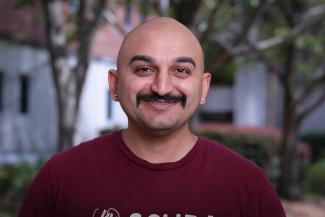Bhargav Karamched

Interest
Cellular neuroscience, axonal length-sensing, molecular motor-facilitated transport in neurons, glucose-insulin physiology, spatiotemporal dynamics in synthetic bacterial consortia, theoretical biophysics
Current Research
Size homeostasis in neurons poses a plethora of challenges rooted in the fact that neurons take on incredibly complex structures and exhibit a large cell-size variability. To produce proteins necessary for physiologic requirements and distribute them throughout their body, neurons need to have an intrinsic mechanism by which they sense their own size. The underlying mechanism is not yet well-understood. Bhargav Karamched's lab uses a theoretical approach to address such problems. By developing stochastic models of such biological processes and invoking approximations to understand their models analytically, they seek to provide theoretical frameworks for various processes and unveil mechanisms underlying them. Currently, they are developing stochastic models to understand the development of polarity in nascent neurons and transport processes involving autophagosomes in neurons. Karamched's lab typically works in close collaboration with experimentalists with the hope that they inspire new mathematics from the lab, and the lab quantitates the biophysical mechanism of interest in their experiments.

